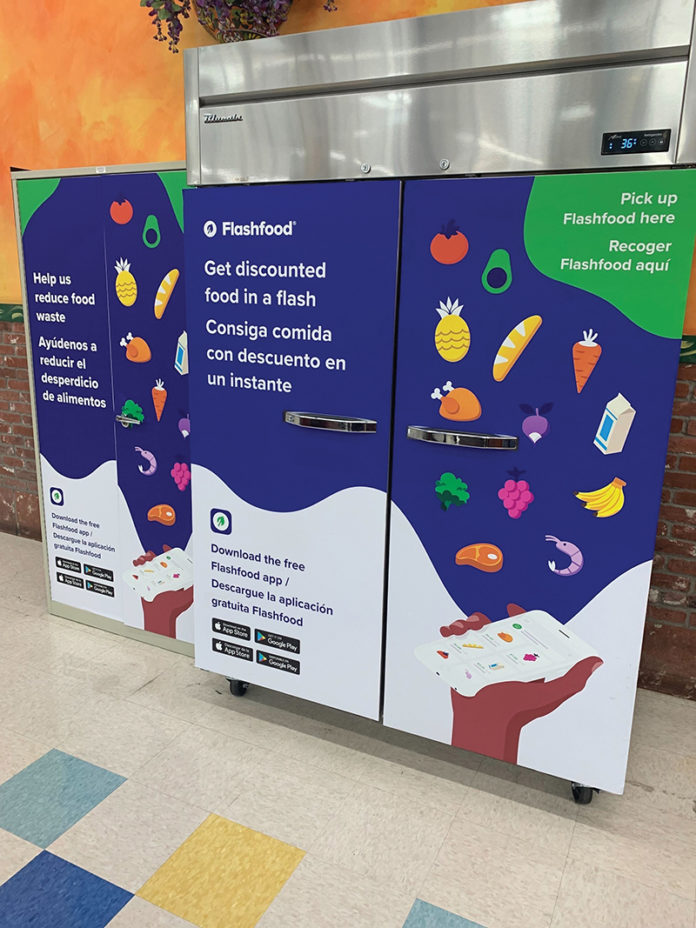Vallarta Supermarkets is tackling food waste and affordability through a pilot program with Toronto-based Flashfood, an app that connects shoppers with highly discounted food nearing its “best by” date.
The pilot has commenced at five Vallarta locations — three in Palmdale and two in Lancaster. Vallarta Supermarkets Director of Marketing Lizette Gomez said that the locations made sense because they are centrally located and near one another, something that would not have been attainable in Vallarta’s urban locations. In total, the Sylmar-based supermarket company has 53 locations across California.
“Partnering with Flashfood enables us to connect with our communities and especially help our shoppers save up to about 50% on groceries,” Gomez said.
Another reason behind why the pilot locations were chosen over others included income demographics, according to Gomez. “An estimated one in nine Americans are food insecure, including more than 15% of shoppers in Lancaster and Palmdale,” Flashfood Chief Executive and Founder Josh Domingues said in a statement.
Financial terms of the partnership were not disclosed, but the length of the pilot will depend on success and usage metrics according to Domingues, who added that Flashfood pilot programs usually take two to three months to conclude.
Savings plan
Customers can purchase produce boxes, dairy, meat and other items through the Flashfood app and pick up orders from a designated zone within each of the Vallarta stores. Flashfood has so far diverted 40 million pounds of food from reaching landfills and saved shoppers more than $100 million, according to a company statement.
The partnership marks Flashfood’s entry into the West Coast market, backing the more than 1,200 participating grocery locations it has in the United States and Canada.
“I think that people need us now more than ever,” Domingues said. “As inflation continues, and food prices seemingly continue to rise, this is very important for a lot of folks.”
One in five Californians, which is about 8 million people, struggled with food insecurity in 2020, according to the California Association of Food Banks. Food insecurity has been rising steadily this year, per the association.
Domingues said that a challenge for Flashfood is how much reliance its business has on partnerships with grocers, which the company cannot operate independently from in any way. He added that some turbulence has also come from pandemic-induced staff shortages that made grocers simply focus on surviving as opposed to seeking partnerships.
However, Flashfood believes it can capitalize on its start in the West Coast market.
“I think that when you have competitive grocers in the same market, it creates more supply on the Flashfood app where a rising tide lifts all boats,” Domingues explained. “You can’t really put all of your stores on Flashfood, but you can put enough that benefits a certain shopper base so having density around competitive grocers ends up making a net benefit to all parties on (the app).”
Store robots
Vallarta’s pilot program with Flashfood is not its only foray into technological additions to its stores, as the Sylmar-based company has also engaged in an autonomous robot pilot program with Badger Technologies.
Badger’s autonomous robots will be helping five Vallarta stores by identifying hazards such as spills and notifying employees through a store’s public address system and through mobile pulse alerts. The five locations are located in Fresno, Kern, Los Angeles and San Bernadino counties.
“The robot gives us another pair of eyes to be more proactive in pinpointing spills and debris,” Suzanne Wong, director of operational excellence at Vallarta, said in a statement. “The result is heightened awareness among our staff and customers that we place a big priority on store safety and cleanliness. Other benefits include improvements in customer service, labor efficiency and data for risk management.”
A sixth Vallarta location is being used for the testing of a robot’s inventory management capabilities. The robot is equipped with an automated detection function that will identify out-of-stock product inventory.
Cloud-based analytics and reporting software can generate a list of absent, misplaced and mispriced products. Data produced by the robot can also provide insights into buying trends and how well product displays and advertising promotions are performing.
William Santiago, Badger’s chief executive, has touted his company’s tech as a help to grocers’ labor shortages.
“The opportunities to offload tedious but important floor inspections while gathering real-time data on product inventory makes a huge difference for retailers, especially as they grapple with continued labor shortages,” Santiago said in a statement. “Our multipurpose autonomous robots offer much-needed relief by amplifying and extending staff operations while producing the data needed to improve customer satisfaction, storewide operations and retail revenues.”
Both pilot programs come on the heels of a busy few months for Vallarta, which recently opened a new location in Van Nuys that is about 40,000 square feet.
